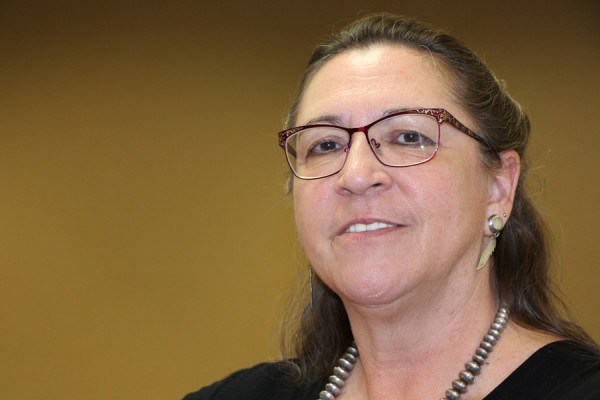 English professor Sandra Muse Isaacs likes to impart knowledge through storytelling.
English professor Sandra Muse Isaacs likes to impart knowledge through storytelling.
UWindsor’s Sandra Muse Isaacs is a self-described chatterer.
“I’m Bird Clan. We’re the storytellers,” said Dr. Muse Isaacs, an English professor who teaches courses in Indigenous literature and 19th Century crime and detective fiction.
Muse Isaacs, one of five new Indigenous faculty members hired through the President’s Indigenous Peoples Scholars Program, earned her undergraduate degree in English at the University of Windsor and was the first Indigenous woman to get a master’s degree in creative writing at the school.
“I’ve come full circle,” she said of now being at the university to teach.
“I felt loved here, supported here, nurtured,” she said, recalling the struggles of returning to school as a single mom and the comfort she found at the Turtle Island Native Student Centre.
“I adored many of my professors. I felt I was in an incubator.”
One of 13 siblings, Muse Isaacs was born in Detroit, at the same hospital where magician Harry Houdini died. While she is Giduwah, more commonly known outside Indigenous culture as Cherokee, she heard Ojibwa stories growing up. After her mother died, Muse Isaacs and her son began going to her grandmother’s reservation in North Carolina for Green Corn ceremonies, “for spiritual revitalization and healing.”
With a college diploma, she worked as a journalist in London and Windsor for a few years, later meeting her husband while covering the Caledonia land dispute. She has made her home with him on the Six Nations of the Grand River near Brantford where she returns every weekend.
For her doctoral work at McMaster University, she and her husband moved to her grandmother’s reserve in North Carolina for three years. Her dissertation-turned book, Eastern Cherokee Stories: A Living Oral Tradition and its Cultural Continuance, is set to be published this fall.
“It’s an analysis… very academic,” she said, explaining she has begun work on a second book that will be a collection of contemporary Cherokee oral stories.
Her next research project is to travel to Mi’kmaq territory in Cape Breton to collect stories of their “little people” to compare with the Cherokee Tsunsdi Yuwi, small beings said to live in homes as protectors and who sometimes get mischievous and move things around.
Muse Issacs said her culture permeates how she interacts with her students.
“I try to teach in an Indigenous way,” she said. “I like to sit at a table and share and talk. It’s not so much like lecturing.”
That’s how Indigenous storytellers have done it for generations, she said.
“They weren’t standing in front of everyone like an expert.”
Muse Isaacs said storytelling is an effective way to impart knowledge. “You remember what someone says more than something you’ve read.”
She wants to teach storytelling in a course on Indigenous oral tradition. Other classes she hopes to introduce are Indigenous detective stories, Native women writers and, because of the university’s location on the traditional territory of the Three Fires Confederacy of First Nations, a course in Ojibwa literature.
Muse Isaacs intends to reach out to local high school English teachers, offering herself as resource on Indigenous literature. She said she would also like to offer creative writing courses for Indigenous writers in the area.
Muse Isaacs said she is pleased the university is recognizing Indigenous culture in both its course offerings and faculty hiring. The Faculty of Law has several high-profile Indigenous scholars and an elder-in-residence program, and law students are required to take an intensive Indigenous legal traditions course.
“The President’s Indigenous Peoples Scholars program has dramatically increased the university’s ability to give realization to the call by the Truth and Reconciliation Commission to change educational practices and curriculum to be more inclusive of Aboriginal knowledge and history,” said Jeff Berryman, acting provost and vice-president, academic.
“The PIPS scholars are sharing their knowledge and experiences with their new colleagues, which is already bearing fruit with new courses being offered.”
Muse Isaacs said she found an instant “community” in fellow PIPS program hires Andrea Sullivan-Clarke in philosophy, Rebecca Major in political science, Ashley Glassburn Falzetti in women’s and gender studies, and Onawa LaBelle in psychology.
“It’s great,” said Muse Isaacs, pleased that her alma mater is embracing Indigenous culture. “I’m right where I’m supposed to be.”
—Sarah Sacheli
